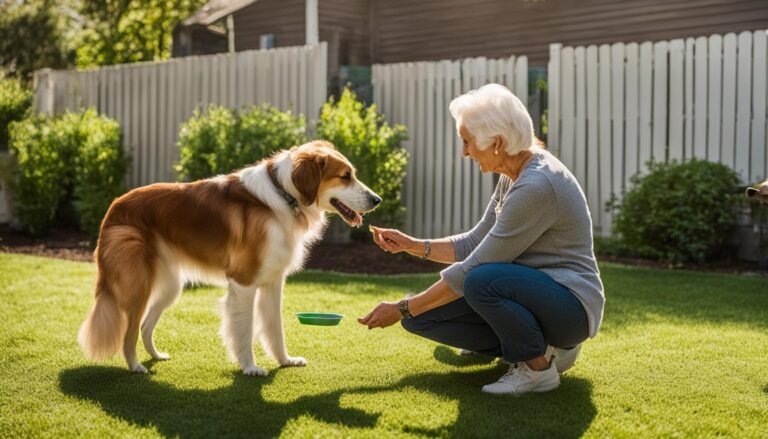How Much Is Obedience Training for Dogs?
Are you wondering about the cost of obedience training for your furry friend? It’s important to invest in training to ensure your dog’s well-being and behavior.
But how much does it actually cost?
Let’s get into dog obedience training prices to give you a better idea.
Factors Affecting Dog Training Costs
The cost of dog training can vary based on several factors. Understanding these factors can help you make an informed decision about the best obedience training for your dog at a cost that fits your budget.
Type of Training Needed
- Basic obedience training typically costs less than specialized training programs.
- If your dog requires specific skills or behavior modification, you may need to invest in more extensive training, which can increase the overall cost.
Training Methods Used
- Trainers who use positive reinforcement methods tend to charge higher fees due to the effectiveness and humane nature of these techniques.
- On the other hand, trainers employing aversive methods may charge lower fees, but it’s important to prioritize your dog’s well-being and opt for positive reinforcement training.
Duration and Intensity of Training Program
- The longer the training program and the more sessions required, the higher the cost.
- Intensive training programs, such as stay-and-train programs where your dog stays with the trainer, may also incur additional expenses.
It’s worth mentioning that although cost is a significant consideration, choosing the right trainer who prioritizes your dog’s well-being and utilizes positive reinforcement methods is crucial. Now, let’s explore some affordable options for dog obedience classes.
(Don’t forget to include the image above. Place it somewhere in the middle of the text.)
Different Types of Dog Training and Their Costs
When it comes to dog training, there are various options available to meet your needs and budget.
Whether you’re looking for basic obedience training or specialized programs, understanding the different types of training and their associated costs can help you make an informed decision.
Group Training Classes: Group training classes are a popular and cost-effective way to train your dog. These classes typically span several weeks and allow you and your dog to learn in a group setting. Group training classes usually range from $150 to $200, making them an affordable option for many dog owners.
Stay-and-Train Programs: If you prefer to have your dog trained by professionals, stay-and-train programs might be the right choice for you. In these programs, your dog stays with a trainer for an extended period and receives intensive training. While stay-and-train programs can provide faster results, they often come with a higher price tag. Costs for stay-and-train programs can reach up to $4,000, depending on the duration and level of training.
Consultations for Puppies or New Dogs: If you have a new puppy or recently adopted a dog, consultations with a trainer can be beneficial. These consultations typically involve a one-time fee and focus on addressing specific training needs and behaviors. The cost of consultations can vary depending on the trainer and the level of expertise they offer.
Find Local Dog Obedience Training: To find local dog obedience training options, you can start by searching online directories and platforms dedicated to connecting dog owners with trainers in their area. Additionally, you can ask for recommendations from friends, family, or your veterinarian. Word-of-mouth referrals often lead to great training experiences and can help you find trainers who meet your specific requirements.
Remember, the cost of training sessions can vary depending on factors such as location and the trainer’s rates. It’s essential to consider your budget and the level of expertise you’re looking for when choosing a training program for your furry friend.

When choosing a dog trainer, also consider their credentials, experience, and training methods. It’s crucial to find a trainer who utilizes positive reinforcement techniques and has the necessary qualifications. Certified professional dog trainers are an excellent choice as they have demonstrated their expertise in the field.
By exploring the different types of dog training programs available, considering your budget, and choosing a trainer with the right credentials, you can provide your dog with the training they need to thrive. Remember, investing in their obedience training will benefit both you and your four-legged companion in the long run.
Choosing the Right Dog Trainer
When it comes to choosing a dog trainer, it’s essential to consider their credentials and experience. You want someone who has the knowledge and expertise to train your furry friend effectively. Look for trainers who have certifications and acronyms after their name, such as CPDT-KA (Certified Professional Dog Trainer – Knowledge Assessed). This certification indicates that they have passed a rigorous examination and met the standards set by professional organizations.
Experience also plays a crucial role in finding the right dog trainer. Experienced trainers have honed their skills through years of working with different breeds and behavior issues. They understand the nuances of canine behavior and can tailor their training methods accordingly. Additionally, experienced trainers often have a proven track record of successful training outcomes.
Continuing education is another aspect to consider when choosing a dog trainer. Look for trainers who regularly attend workshops, seminars, and conferences to stay updated on the latest training techniques and research. Ongoing education shows their commitment to providing the best training methods for your dog.
Avoid trainers who promise quick fixes or resort to aversive methods like choke chains or shock collars. Positive reinforcement methods, such as rewarding desired behaviors with treats and praise, are not only effective but also humane. These methods create a positive learning environment for your dog and strengthen the bond between you and your furry companion.
Remember, choosing the right dog trainer is crucial in ensuring your dog receives proper and effective training. Take the time to research trainers, read reviews, and ask for recommendations. By finding a trainer with the right credentials, experience, and commitment to positive reinforcement methods, you can set your dog up for success in their training journey.
Factors to Consider in Dog Training
When it comes to dog training, cost is certainly an important factor to consider. However, it’s essential to prioritize the quality and effectiveness of the training methods. While investing in professional dog training services can provide significant benefits, there are also cost-effective options available that can help you train your dog effectively.
One great option for cost-effective dog training is to leverage online dog training resources. These online platforms offer a wealth of valuable information and training techniques that you can implement in the comfort of your own home. Some popular online dog training resources include JW Dog Training and Behavior, Dog Training by Kikopup, and Simpawtico Dog Training. These resources not only help you save money but also provide you with the flexibility to train your dog on your own schedule.
Another crucial aspect to consider in dog training is the training method itself. Positive reinforcement training techniques have been scientifically proven to be more effective and humane compared to punishment-based training methods. Positive reinforcement training involves rewarding desired behaviors with treats, praise, and positive reinforcement. This method not only fosters a strong bond between you and your dog, but it also encourages them to repeat the desired behavior.
By focusing on cost-effective dog training options and utilizing positive reinforcement techniques, you can effectively train your dog without breaking the bank. Remember, the goal of training is to not only teach your dog good behaviors but also strengthen the bond between you and your furry friend.

- Save money by utilizing online dog training resources.
- Choose positive reinforcement training methods for effectiveness and humane training.
- Train your dog at your own pace and on your own schedule.
- Strengthen the bond between you and your dog through training.
Additional Considerations in Dog Training
In addition to basic obedience training, there are specialized training programs available to meet specific needs. Whether you have a dog with problem behaviors or you’re looking to train a service dog or therapy dog, these specialized programs can provide tailored training to address your dog’s unique requirements.
Training a service dog involves teaching tasks that are related to disabilities, such as retrieving items, opening doors, or providing support during seizures. These programs require a high level of expertise and customization, which may result in higher costs due to the specialized training and guidance provided.
Similarly, training a therapy dog requires teaching them to interact with individuals in therapeutic settings such as hospitals or nursing homes. This type of training focuses on developing the dog’s ability to provide comfort, emotional support, and companionship to those in need.
When it comes to addressing specific problem behaviors, consulting with a behaviorist or behavior consultant is essential. These professionals have advanced knowledge and experience in modifying and addressing complex behavioral issues. They can analyze your dog’s behavior, identify the underlying causes, and develop a customized training plan to address those issues effectively.
Remember, behaviorists and trainers serve different roles. While trainers focus on teaching commands and obedience, behaviorists specialize in analyzing and modifying problem behaviors. So, depending on the needs of your dog, it is important to choose the right professional who can provide the necessary expertise.
Tips for Finding Dog Training Services
When it comes to finding reliable dog training services, there are several strategies you can employ. One effective method is to utilize online search engines and directories, such as The Academy of Pet Careers website. These resources enable you to search for local trainers and training centers by entering your location and the specific type of training you’re seeking. This way, you can easily find options that are convenient for you and your furry friend.
Another valuable resource to consider is local directories, which often include information on trainers and training facilities in your area. You can also check community bulletin boards or pet-related magazines for recommendations and insights from fellow pet owners. Veterinarians and local dog clubs are additional sources of reliable information, as they may be familiar with reputable trainers or have experience working with them.
Don’t underestimate the importance of personal observation. Visiting local dog training centers or pet stores that offer training services allows you to see the facility firsthand and get a sense of the trainers’ approach. This way, you can assess the training environment and determine if it aligns with your expectations. Meeting the trainers face-to-face also provides an opportunity to gauge their professionalism and rapport with dogs, ensuring they are a good fit for your furry companion.
FAQ
How much does obedience training for dogs cost?
FAQ
How much does obedience training for dogs cost?
The cost of obedience training for dogs can vary depending on factors such as the type of training and the trainer’s credentials. Individual training sessions can range from $1,500 to $2,000 on average, while group training classes usually cost around $150 to $200. Stay-and-train programs can be more expensive, reaching up to $4,000. It is recommended to research and choose a trainer based on their credentials, experience, and training methods.
What factors can affect the cost of dog obedience training?
The cost of dog training can be influenced by factors such as the type of training needed, the trainer’s methods, and the duration and intensity of the program. It is important to consider these factors when determining the overall cost of dog training. It is also possible to find affordable options for dog obedience classes, but it is crucial to choose a trainer who prioritizes positive training methods.
What are the different types of dog training programs available and how much do they cost?
There are various types of dog training programs available, each with its own cost. Group training classes are a more affordable option, typically ranging from $150 to $200 for several weeks of training. Stay-and-train programs, where the dog stays with a trainer, can be more expensive, with costs reaching up to $4,000. Consultations for puppies or new dogs are another option, usually costing a flat fee.
How should I choose the right dog trainer?
When choosing a dog trainer, it is important to consider their credentials and experience. Look for trainers who have certifications such as CPDT-KA, which signifies that they are a certified professional dog trainer. It is also beneficial to choose a trainer who has ongoing education and attends conferences. Experience and a commitment to professional development are important factors to consider. Additionally, avoid trainers who use aversive methods and prioritize trainers who use positive reinforcement training.
What factors should I consider in dog training?
Cost is an important factor to consider in dog training, but it is crucial to prioritize the quality and effectiveness of the training methods. There are cost-effective options available, such as online dog training resources and positive reinforcement training techniques. It is recommended to focus on positive reinforcement training, which rewards desired behaviors with food, praise, and positivity. This method has been scientifically proven to be more effective than punishment-based training.
Are there specialized training programs available for specific needs?
Yes, there are specialized training programs available for specific needs, such as training service dogs or therapy dogs. These specialized programs may have higher costs due to the complexity and customization involved. It is important to consult with a behaviorist or behavior consultant if your dog has specific problem behaviors or needs. A behaviorist can provide specialized expertise in addressing and modifying problem behaviors.
How can I find reliable dog training services?
To find reliable dog training services, consider utilizing online search engines and directories. You can also check local directories, community bulletin boards, or pet-related magazines for information on trainers and training facilities. Recommendations from veterinarians, fellow pet owners, and local dog clubs are also valuable sources of information. Visiting local dog training centers or pet stores that offer training services allows you to observe the facility and meet the trainers before making a decision.
,500 to ,000 on average, while group training classes usually cost around 0 to 0. Stay-and-train programs can be more expensive, reaching up to ,000. It is recommended to research and choose a trainer based on their credentials, experience, and training methods.
What factors can affect the cost of dog obedience training?
The cost of dog training can be influenced by factors such as the type of training needed, the trainer’s methods, and the duration and intensity of the program. It is important to consider these factors when determining the overall cost of dog training. It is also possible to find affordable options for dog obedience classes, but it is crucial to choose a trainer who prioritizes positive training methods.
What are the different types of dog training programs available and how much do they cost?
There are various types of dog training programs available, each with its own cost. Group training classes are a more affordable option, typically ranging from 0 to 0 for several weeks of training. Stay-and-train programs, where the dog stays with a trainer, can be more expensive, with costs reaching up to ,000. Consultations for puppies or new dogs are another option, usually costing a flat fee.
How should I choose the right dog trainer?
When choosing a dog trainer, it is important to consider their credentials and experience. Look for trainers who have certifications such as CPDT-KA, which signifies that they are a certified professional dog trainer. It is also beneficial to choose a trainer who has ongoing education and attends conferences. Experience and a commitment to professional development are important factors to consider. Additionally, avoid trainers who use aversive methods and prioritize trainers who use positive reinforcement training.
What factors should I consider in dog training?
Cost is an important factor to consider in dog training, but it is crucial to prioritize the quality and effectiveness of the training methods. There are cost-effective options available, such as online dog training resources and positive reinforcement training techniques. It is recommended to focus on positive reinforcement training, which rewards desired behaviors with food, praise, and positivity. This method has been scientifically proven to be more effective than punishment-based training.
Are there specialized training programs available for specific needs?
Yes, there are specialized training programs available for specific needs, such as training service dogs or therapy dogs. These specialized programs may have higher costs due to the complexity and customization involved. It is important to consult with a behaviorist or behavior consultant if your dog has specific problem behaviors or needs. A behaviorist can provide specialized expertise in addressing and modifying problem behaviors.
How can I find reliable dog training services?
To find reliable dog training services, consider utilizing online search engines and directories. You can also check local directories, community bulletin boards, or pet-related magazines for information on trainers and training facilities. Recommendations from veterinarians, fellow pet owners, and local dog clubs are also valuable sources of information. Visiting local dog training centers or pet stores that offer training services allows you to observe the facility and meet the trainers before making a decision.






